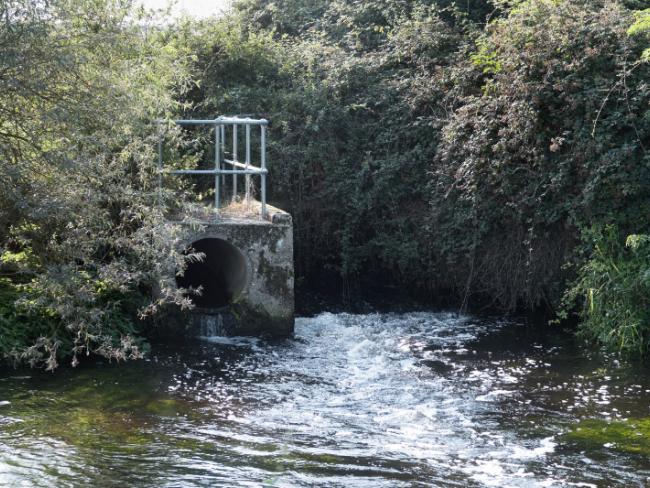15 April 2024

“Poo Corner” on the River Loddon near Basingstoke. Thames Water’s Chineham sewage works pumped untreated sewage into the clean chalk stream 40 times in 2020. Photo Chris via Flickr (CC BY-NC-ND 2.0).
Britain’s largest privatised water company is in financial trouble. And it’s not alone. This threatens the supply and safety of our water. It need not be that way.
Some countries have real material problems with supplying fresh water as they have serious drought conditions or little infrastructure. That does not apply to Britain: we are blessed with plentiful rain, and in the winter of 2023 to 2024 rather too much of it. And we have comprehensive infrastructure, even if it has been neglected.
Control
But as a working class we’ve been too willing to give up control of the essentials of life to capitalism. This has now made us a country with serious water problems: it’s expensive; there are summer hosepipe bans and sewage contamination is rife.
Who could ignore the latest indignity? Would the iconic Oxford and Cambridge boat race be won by the most competent rowers, or by the crew least hit by E coli infections – picked up from their practice on the water? The problem is nationwide but the situation at Thames Water is acute.
Precarious
Month by month our water industry looks ever more precarious. At the end of February we reported on the increased level of sewage pollution. Now the industry’s financing problems are to the fore.
When Thames Water, a company which now serves 16 million people, was privatised under the Thatcher government in 1989 it was a company without any debt. Now it is collapsing under an £18 billion debt pile.
Plunderers
Over £7 billion in dividends has been paid to Thames Water shareholders between 1990 and 2022. Australian infrastructure asset management firm Macquarie bought Thames in 2006 and sold it on in 2017. During that 11-year period £2.8 billion was paid to shareholders – Macquarie and others. Describing themselves as “investors”, it would be more correct to say they were “plunderers”, extracting cash from Thames.
On Friday 5 April it emerged that Thames Water’s current parent company Kemble had missed interest payments on a £400 million loan. And Kemble is meant to repay £190 million of that loan by the end of April to a consortium of lenders including Bank of China and the Industrial and Commercial Bank of China.
‘The solution according to Thames Water is to raise bills by 56 per cent by 2030.’
If the government allows it, and we acquiesce, two state-backed Chinese banks are likely to have a significant hand in determining the company’s future. The only solution according to Thames Water is to raise bills by 56 per cent by 2030, including inflation – that’s around £262 for each household. It has asked the government to allow this.
Kemble is no more than a holding company for the “investors” that bought Thames from Macquarie. The largest shareholders are a Canadian public sector pension fund (32 per cent) and the UK Universities Superannuation Scheme (20 per cent). The rest are a mix of other financial institutions, and sovereign wealth funds (notably Abu Dhabi 10 per cent and China 8 per cent).
What is to be done?
The only solution is that those who work in the industry must take charge. A difficult ask as the period since 1989 has seen workers retreat from the fray. Now less than a third of those who work in the industry are unionised. In 1995 it was around 56 per cent. The first sensible step would be to reverse that decline and make the demands of workers in the industry heard again.
One demand must be for the debt to be ignored. Trade unionists should never forget the ruling in the case of Northern Rock bank. Its shareholders were paid zero compensation when the bank was taken into public ownership during the 2008 financial crisis.
Public interest
The Court of Appeal ruled against the Northern Rock shareholders, saying: “The court would only interfere if it were to conclude that the state’s judgment as to what is in the public interest is manifestly without reasonable foundation.” Already campaigners have argued the same principle ought to apply in the case of Thames Water.
‘Effective leadership from trade unionists would strike a chord.’
Workers in the industry should take heart from the legion of water and waterways users who are increasingly prepared to challenge misinformation about sewage discharges and so on. An effective leadership from trade unionists in the water industry would strike a chord; they would find allies everywhere in the wider class.
Bold demands
Those who work in the water industry must also be bold in making demands on other bodies. Many of the difficulties with water infrastructure are caused by other policy decisions and other industries.
Those who work in the water industry must be prominent in saying “No more building on flood plains”. In London and other major cities a prohibition on any further paving of front gardens would immediately contribute to reducing storm surges and sewage discharges. Not to mention the prohibition of wet wipes, which block sewers and end up as “wet wipe reefs” in the tidal Thames and other rivers.
